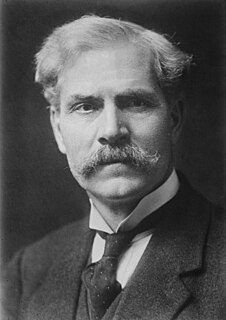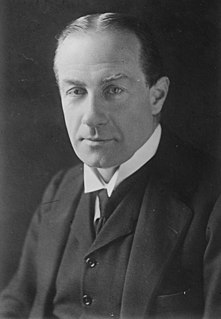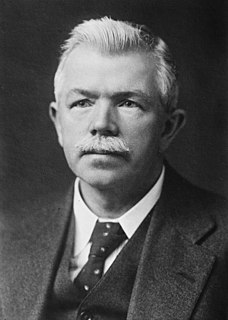
James Ramsay MacDonald was the first Prime Minister of the United Kingdom who belonged to the Labour Party, leading minority Labour governments for nine months in 1924 and again between 1929 and 1931. From 1931 to 1935, he headed a National Government dominated by the Conservative Party and supported by only a few Labour members. MacDonald was expelled from the Labour Party as a result.

The Independent Labour Party (ILP) was a British political party of the left, established in 1893 at a conference in Bradford, after local and national dissatisfaction with the Liberals' apparent reluctance to endorse working-class candidates, representing the interests of the majority. A sitting independent MP and prominent union organiser, Keir Hardie, became its first chairman.
In UK politics, the Parliamentary Labour Party (PLP) is the parliamentary party of the Labour Party in Parliament, i.e. Labour MPs as a collective body. Commentators on the British Constitution sometimes draw a distinction between the Labour Party and the Conservative and Liberal parties. The term Parliamentary Labour Party refers to the party in Parliament, whereas the term Labour Party refers to the entire Labour Party, the parliamentary element of which is the PLP.

Clive James Charles Betts is a British Labour Party politician and former economist, who was the Member of Parliament (MP) for Sheffield Attercliffe from 1992 to 2010 and is the current MP for the successor seat of Sheffield South East.

The 1935 United Kingdom general election was held on Thursday 14 November 1935 and resulted in a large, albeit reduced, majority for the National Government now led by Stanley Baldwin of the Conservative Party. The greatest number of members, as before, were Conservatives, while the National Liberal vote held steady. The much smaller National Labour vote also held steady but the resurgence in the main Labour vote caused over a third of their MPs, including National Labour leader Ramsay MacDonald, to lose their seats.
The National Labour Organisation, also known as the National Labour Committee or simply as National Labour, was a British political group formed after the 1931 creation of the National Government to co-ordinate the efforts of the supporters of the government who had come from the Labour Party. The party leaders were Ramsay MacDonald (1931–1937) and his son Malcolm MacDonald (1937–1945).

The 1923 United Kingdom general election was held on Thursday 6 December 1923. The Conservatives, led by Stanley Baldwin, won the most seats, but Labour, led by Ramsay MacDonald, and H. H. Asquith's reunited Liberal Party gained enough seats to produce a hung parliament. It is the most recent UK general election in which a third party won over 100 seats. The Liberals' percentage of the vote, 29.7%, has not been exceeded by a third party at any general election since.

The 1922 United Kingdom general election was held on Wednesday 15 November 1922. It was won by the Conservative Party, led by Bonar Law, which gained an overall majority over the Labour Party, led by J. R. Clynes, and a divided Liberal Party.

John Robert Clynes was a British trade unionist and Labour politician. He was a Member of Parliament (MP) for 35 years, and as Leader of the Labour Party (1921–1922), led the party in its breakthrough at the 1922 general election.

George Alfred Isaacs JP DL was a British politician and trades unionist who served in the government of Clement Attlee.

The 2003 Conservative Party leadership election was caused by the enforced resignation of incumbent leader Iain Duncan Smith after the loss of a confidence vote among his parliamentary party. The causes of Duncan Smith's fall are often cited as his lack of charisma and impact with the public, the uninspired direction of the party under his leadership, and his previous failure to achieve more than a third of support among Members of Parliament in the 2001 leadership contest. In the event, the Conservative Party coalesced around Michael Howard as replacement leader and there was not a contest to replace Duncan Smith.

The 1935 Labour Party leadership election took place on 26 November 1935 when Herbert Morrison and Arthur Greenwood challenged Clement Attlee, the incumbent party leader of only one month and one day. Attlee, previously Deputy Leader, had been appointed as an interim leader the previous month when George Lansbury resigned and the general election was looming.

The 1960 Labour Party leadership election was held when, for the first time since 1955, the incumbent leader Hugh Gaitskell was challenged for re-election. Normally the annual re-election of the leader had been a formality. Gaitskell had lost the 1959 general election and had seen the Labour Party conference adopt a policy of unilateral nuclear disarmament which he considered disastrous and refused to support. A vacancy in the deputy leadership was first made by the death of incumbent Aneurin Bevan.

The Leader of the Labour Party is the head of the Labour Party of the United Kingdom. The current leader is Sir Keir Starmer, who was elected in April 2020 to succeed Jeremy Corbyn, having previously spent 9 months as Shadow Minister of Immigration and 3 years, 5 months as Shadow Secretary of State for Exiting the European Union in Corbyn's shadow cabinet.
The Labour Party is a political party in the United Kingdom that has been described as an alliance of social democrats, democratic socialists and trade unionists. The Labour Party sits on the centre-left of the political spectrum. In all general elections since 1922, Labour has been either the governing party or the Official Opposition. There have been six Labour prime ministers and thirteen Labour ministries.

Alexander Cunningham is a British politician who has served as Member of Parliament (MP) for Stockton North since 2010. A member of the Labour Party, he has been Shadow Minister for Courts and Sentencing since 2020.

Herbert Stanley Morrison, Baron Morrison of Lambeth, was a British Labour politician who held a variety of senior positions in the Cabinet. During the inter-war period, he was Minister of Transport during the 1929–1931 Labour Government, then, after losing his seat in Parliament in 1931, became Leader of the London County Council in the 1930s. Returning to the Commons in 1935, he was defeated by Clement Attlee in the Labour leadership election that year, but later acted as Home Secretary in the wartime coalition.
The Leicester by-election was a Parliamentary by-election. It returned one Member of Parliament (MP) to the House of Commons of the United Kingdom, elected by the first past the post voting system.
Imran Hussain is a British Labour Party politician and a barrister. He became the Member of Parliament (MP) for the constituency of Bradford East after gaining the seat from the Liberal Democrats at the 2015 general election. He was re-elected to Parliament in 2017 and 2019.















